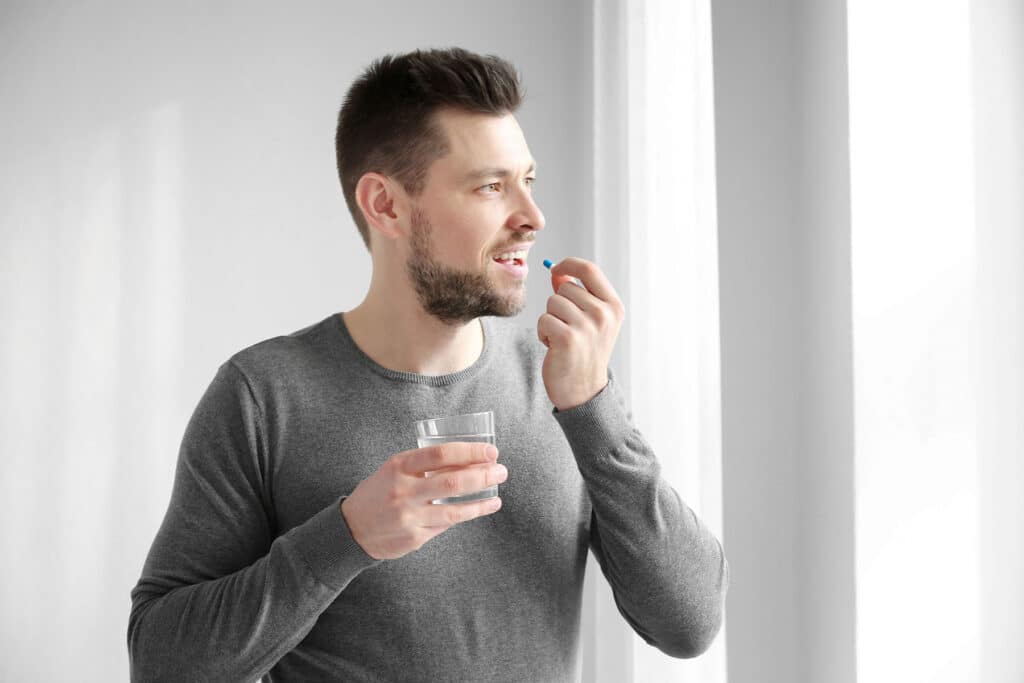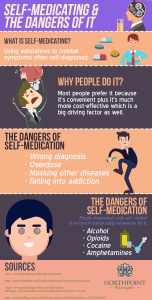Self-medicating is a behavior that has been practiced for decades. This practice has gotten much worse with the invention of the Internet, which makes self-medicating very simple. For many people, self-medicating is as simple as doing a quick Internet search for a specific ailment. Once they have seemingly diagnosed themselves, they’ll turn to an over-the-counter remedy to help. However, for others, self-medicating takes on an entirely different look altogether, often leading to addiction—one of the dangers of self-medicating.
Northpoint Washington offers substance use treatment programs in Edmonds, Washington. We know that coping with distress, pain, and mental health symptoms alone can be challenging. If you or a loved one now struggle with addiction due to self-medicating, we can help. Call 888.450.2153 today to get started.
What Is Self-Medicating?
Where addiction is concerned, self-medicating refers to the practice of using substances to help with certain symptoms. Typically, these symptoms are self-diagnosed or self-recognized. Sometimes they are professionally diagnosed but not controlled well by medication. When either situation occurs, people naturally look to something that will provide them with relief. For a growing number of people, self-medication has become the norm, rather than the exception.
Why Do People Self-Medicate?
There could actually be a number of reasons why self-medication is so attractive to people. These reasons include:
- It’s much more convenient to self-medicate than to go to a doctor.
- It takes less time.
- It can be cost-effective, especially for those without insurance.
- They may be afraid or even ashamed of their conditions.
- They believe medical care is not going to be good enough.
Sometimes people self-medicate because they’re just looking for a quick fix. For example, antidepressants can take some time before they begin working. For someone who struggles with depression, using a stimulant drug might produce a quicker result. This is just one instance that makes self-medication so attractive to those who do it.
The Dangers of Self-Medicating
Quite often, people will self-medicate as a way to avoid going to the doctor or hospital. What they don’t realize is that this puts them at a much greater risk of needing professional help. There are many dangers associated with self-medication. These include:
- Experiencing a drug interaction
- Overdose
- Misdiagnosing one’s self
- Masking a potentially serious disease
- Substance abuse and, eventually, addiction
- Legal problems resulting from using an illegal substance
Anyone with a chronic medical or mental health condition should avoid self-diagnosing. Self-medication is never helpful in the long term. It may provide short-term benefits, but in the end, it generally just makes the condition much worse.
What Drugs Are Usually Used for Self-Medication?
People will frequently use different substances as a way to self-medicate. Some of the more common ones are listed below.
Alcohol
Although alcohol is a depressant, it can temporarily help with depression. Many people will use it to help with anxiety, as well. For example, someone who has social anxiety may have a few drinks to calm their nerves before a party. Eventually, as alcohol continues to be abused, it can lead to alcohol use disorder (AUD). As AUD develops, symptoms of anxiety or depression are very likely to return.
Opiate Drugs
Opiate drug use is very common in the United States. Many people who use opiate drugs also suffer from depression. Opiates will result in a sensation of euphoria. This can temporarily help to improve the symptoms of depression. However, using opiates heavily can result in worsening depression symptoms.
Cocaine
Cocaine is a life-threatening drug. It is illegal, and it is often used to combat the symptoms of depression. The euphoria that cocaine evokes can be quite attractive to some people. It can temporarily cause depression symptoms to subside. However, this is little more than a distraction. The cocaine high can quickly wear off, leaving the user even more depressed—this rebound effect is one of the most significant dangers of self-medicating.
Amphetamines
Prescription amphetamines are frequently used as a way to improve issues like ADHD. They’re also used by those without a diagnosed condition. Many college students frequently use amphetamines like Concerta and Strattera to stay awake and study. They may also use them to help improve their focus during class. Amphetamines are highly addictive, with or without a prescription.
Marijuana
Marijuana is a drug that has been found to be somewhat effective at treating some types of depression. However, this is only in small doses. In larger doses, it can actually contribute to these symptoms. The fact that so many states have legalized cannabis means that there are higher rates of addiction.
Does Self-Medicating Mean You Have a Co-Occurring Disorder?
Self-medicating doesn’t always mean you have a co-occurring disorder, but it could. Co-occurring disorders refer to mental health conditions that often occur alongside addictions. Most often, these conditions are present prior to the addiction.
There are many different types of co-occurring disorders that can easily lead to self-medication. These include:
- Anxiety disorders
- Panic disorders
- Depressive disorders
- Post-traumatic stress disorder
- ADHD
- Schizophrenia
- Bipolar disorder
- Borderline personality disorder
- Obsessive-compulsive disorder
Individuals may actually live with any of these conditions for years without realizing it. They may not recognize what their symptoms are and choose various substances for self-medication purposes.
Call Northpoint Washington for Addiction Treatment Now
If you are self-medicating to cope with depression, anxiety, or any other mental health condition, Northpoint Washington is here to help. Our substance use and co-occurring disorder treatment programs in Edmonds, Washington, can provide the comprehensive care you need for a successful recovery.
Find help today by calling 888.450.2153 or completing our online form.






